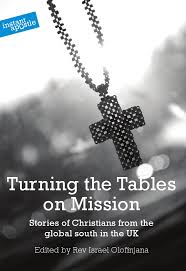Review: Turning the Tables on Mission, edited by Israel Olofinjana

Mission goes both ways. That's the central theme of this somewhat eclectic anthology. It isn't just about Western Europeans, North Americans and South Koreans reaching out to the rest of the world, it's about the rest of the world stretching all the way back to us.
With fewer people in the UK professing an outward declaration of faith or Church membership than they did in days gone by, Britain is now perceived as a mission field by those from what is often referred to as the Global South (Africa, South America, Southern Asia, and the Caribbean).
Reverend Israel Olofinjana has put together this collection to delve deeper into the phenomenon of what many are calling "reverse mission".
Rev Olofinjana states in the introduction that the book has four explicit purposes:
• To provide a resource for those from the Global South coming to the UK so that they can understand what it's like and what to expect.
• To provide a resource for churches in the UK so as to understand where global south missionaries are coming from and to better understand how they can help the British Christian community.
• To answer the critics of reverse mission, and to dispel many stereotypes that Christians in the UK often have about people arriving from the Global South.
• To allow those directly involved in reverse mission to tell their own story on their own terms, as a counterpart to those studies where others have investigated reverse mission from an outside perspective.
By these standards, the book is a great success. Olofinjana uses a structured anthology format to give time to thirteen different accounts. Each section of the book focuses on missionaries from a specific region, and within those there are chapters written by a given missionary highlighting their story, and their experiences in the UK (two from South America, four from Africa, two from Asia, and five from the Caribbean).
At the end of each one, Olofinjana gives a brief overarching set of notes to contextualise what has just been said into the broader pattern of the book. This is very useful in bringing what are often somewhat intimate narratives back to the central focus and argument of the book.
Collectively, the accounts talk about how missionaries came to be working in the UK, what their experiences of the UK were, and what those experiences taught them about how missionaries from the Global South can better work to advance the Gospel in the UK.
Their stories do an excellent job of dispelling myths about those arriving from the Global South. Many of them gave up lucrative and prestigious employment positions in their own country, contrary to the idea that the Global South is primarily a source of economic migrants to the UK. Many of them also sought out to create, or pastor to, multicultural ministries in the UK.
Importantly, Olofinjana uses the book to criticise what he regards as a failing in reverse mission to the UK so far, in that a lot of it is not actually evangelising to the majority of the British people, but instead serving diaspora communities. Olofinjana bemoans the fact that if you ask about Spring Harvest in many black majority churches, they will say "Spring what?", while many people in white churches won't have heard of TD Jakes.
There is a lot of give and take to be had in this book, as both the missionaries and the community receiving them seek to adapt, and that perhaps is the most important lesson to take away from it. It's clear the contributors to the book want readers to understand that Christianity is not a culture, but something far deeper than that, and that consequently, we should not get too bound up with issues like worship style, service ordering or prayer format. Essentially, we need to understand that the way we do things in our church is not the only way to do things.
Helpfully, the book speaks to anyone from abroad thinking about coming to the UK as a missionary - they should not underestimate the challenge! The overarching message is that missionaries shouldn't go to far flung places because they think they will be comfortable there, as both the missionaries and the Christian communities receiving them will not be initially comfortable, or even comfortable in the long term. It can take years to assimilate.
Some of the accounts read better than others but people who have a specific interest in the subject will find this book nonetheless a totemic work of great usefulness. Others who simply want to know more of what God is doing right now in the British Church should read this to get a better understanding and become atuned to the big changes that may be coming if reverse mission continues to grow.











